Trump Favorite Kris Kobach Holds Narrow Lead In Kansas GOP Primary
Kris Kobach, the controversial Secretary of State of Kansas who is also a Trump ally, holds on to a slim lead in the GOP Primary for Governor.
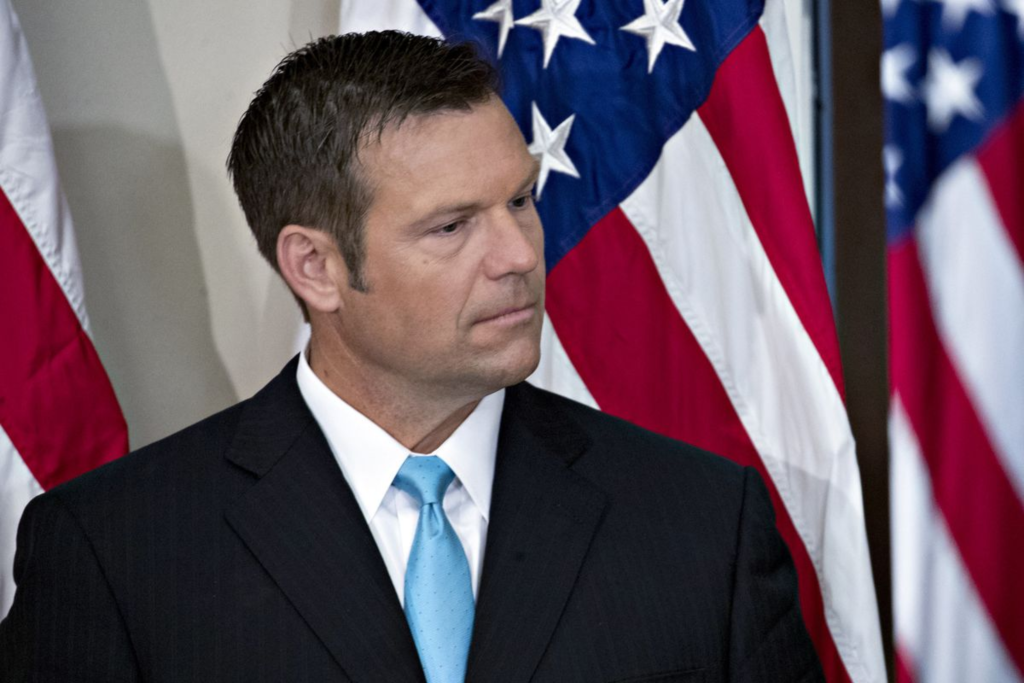
Races for Governor of Kansas rarely get much national attention outside of the state. Partly this is due to the fact that, with Kansas being a solidly red state, the outcome of those races is seldom in doubt. This year, though, the race for the Republican nomination for that office has gotten some national attention due to the fact that one of the candidates is controversial Secretary of State Kris Kobach, who has made a name for himself as a proponent for Voter ID laws and other changes to voter registration laws that many have argued make it more difficult for minorities and the poor to register to vote and to vote even if they are registered. Kobach is facing off against incumbent Governor Jeff Colyer, the former Lt. Governor who took over the job when Brownback was named Ambassador-At-Large for International Religious Freedom, seemed to benefit from a last-minute endorsement from President Trump, but for the moment at least the outcome remains too close to call:
TOPEKA, Kan. — On the same night that a special congressional election in Ohio proved too tight to call, one of the most competitive Republican primaries for governor this summer was also deadlocked early Wednesday, as Kansas’s most populous county struggled to tally its votes in the race between Kris W. Kobach and Gov. Jeff Colyer.
Mr. Kobach, a hard-right conservative endorsed by President Trump and known nationally for his grim warnings about voter fraud and illegal immigration, sent his supporters home from a watch party in Topeka just before 1 a.m. as he clung to a lead of a few hundred votes over Mr. Colyer, with 88 percent of precincts reporting.
“Try to get a good night’s sleep,” Mr. Kobach, the Kansas secretary of state, told the dozens of supporters who remained past midnight at a Topeka hotel as returns trickled in. “I don’t know if I’ll be sleeping much.”
The long night came amid delays in counting the votes in Johnson County in suburban Kansas City, home to more than 500,000 people, where new voting machines were being used. Mr. Kobach, who in his current position oversees the state’s elections, said the results might not be finalized for hours.
Mr. Colyer, a less polarizing but lesser-known conservative who ascended to the state’s top post earlier this year, was polling ahead of Mr. Kobach in Johnson County with several hundred precincts there still uncounted.
The close results in Kansas came after Mr. Trump upended the race on Monday by endorsing Mr. Kobach against the advice of some of the party’s top strategists.
A victory for Mr. Kobach would again demonstrate Mr. Trump’s ability to influence Republican primaries. But it could also create a general election opening for Democrats, currently shut out of power in deeply Republican Kansas, who believe they can mobilize voters opposed to Mr. Kobach’s strident policies and potentially flip the governorship and two or three congressional seats.
The Republican nominee for governor will face Greg Orman, a businessman running as an independent, and the Democratic nominee, projected by The Associated Press to be Laura Kelly, a state legislator.
Kansas has long been among the reddest of red states. Republicans hold all six congressional positions, have carried the state in every presidential election since 1964 and supported Mr. Trump in 2016 by a nearly 21-point margin. Under former Gov. Sam Brownback, a Republican who resigned early this year to become an ambassador, the state became synonymous with a conservative tax-slashing experiment that led to budget cuts and revenue shortfalls.
Mr. Kobach and Mr. Colyer are both politically conservative, though with far different styles and personalities. Mr. Kobach, a Yale-educated lawyer, has for years burnished a national profile by drafting voter I.D. legislation and helping states and cities enact and defend restrictions on voting and immigration. He served as vice chairman of Mr. Trump’s voter fraud panel, which was disbanded after failing to find evidence of the widespread election rigging that the president claimed.
Mr. Colyer served seven years as Mr. Brownback’s lieutenant governor. Since taking over as governor about six months ago, he has tried to broker compromise on a longstanding school funding debate and has signed a law allowing state-contracted adoption agencies to reject gay couples on religious grounds.
(…)
Republicans are bracing for a competitive general election. Though rightward-leaning, Kansas is not monolithic, and has elected Democratic governors from time to time over the years.
Discontent with Mr. Brownback’s policies, coupled with suburban skepticism of Mr. Trump, have led to a resurgence of sorts for centrists and liberals. Democrats and moderate Republicans won several seats in the State Legislature in 2016 and undid much of Mr. Brownback’s signature tax policy. They also passed a Medicaid expansion bill, which Mr. Brownback vetoed.
More from The Kansas City Star:
Kansas awoke Wednesday to a Republican governor’s race that remains too close to call, with final results expected about 8 a.m. after significant problems hobbled Johnson County’s ability to count votes.
At 6 a.m., 541 votes separated Gov. Jeff Colyer and Secretary of State Kris Kobach, who have both waged aggressive campaigns. The razor-thin margin on the Republican side came after Sen. Laura Kelly easily won the Democratic nomination Tuesday night.
The outcome holds national implications: a Kobach loss would embarrass President Donald Trump, who endorsed his informal adviser the day before polls closed.
The final batch of results out of Johnson County is expected to be posted online about 8, state elections director Bryan Caskey said on Twitter.
The secretary of state’s website shows Kobach with 121,203 votes to Colyer’s 120,662, with 95 percent of precincts reporting.
Campaign watch parties in Topeka and Overland Park turned into vigils as supporters of both candidates awaited results. Kobach and Colyer both addressed supporters after midnight, but said nothing definitive.
The slow pace of results came after Johnson County rolled out new voting machines in Tuesday’s election.
“This is quite a deal here,” Johnson County Election Commissioner Ronnie Metsker acknowledged about 11 p.m. after the election offices had released very preliminary advanced voting results.
Earlier in the day, election officials had said they hoped to start posting results by about 7:30 p.m. and finish by 10:30 p.m. Tuesday.
Metsker said one piece of the problem was that turnout was unexpectedly high.
“I think we can safely say turnout was around 30 percent, which is very high for a primary in August,” he said.
The delayed results stemmed in part from long lines in Johnson County. As long as voters were in line by the scheduled closing of 7 p.m., they were allowed to vote, and a few polls did not close until after 8 p.m. The election office did not start to release results until after that time.
Metsker said the voting results were properly tabulated and secured, with a paper audit trail. But he also acknowledged that the new voting system had major problems with reporting the results.
Metsker said the vendor for the new machines, Election Systems & Software, had its best engineers working on the problem throughout the night. He said they had finally found a workaround for the problem about 11 p.m.
The slow crawl left supporters of both Colyer and Kobach to wait for news.
(…)
A Kobach victory would represent a stunning rejection by Republicans of the state’s sitting governor, Colyer, who took over the job in January when Brownback resigned.
If Kobach wins, it will mean Republican voters have embraced a Kansas politician with a rising national profile whose style and politics echo President Donald Trump. The president endorsed the Kansas secretary of state on Twitter less than a day before polls closed.
“I think there’s no question him coming out formally and enthusiastically endorsing moved the needle, too,” Kobach said earlier in the day.
A Kobach victory would represent a stunning rejection by Republicans of the state’s sitting governor, Colyer, who took over the job in January when Brownback resigned.
If Kobach wins, it will mean Republican voters have embraced a Kansas politician with a rising national profile whose style and politics echo President Donald Trump. The president endorsed the Kansas secretary of state on Twitter less than a day before polls closed.
“I think there’s no question him coming out formally and enthusiastically endorsing moved the needle, too,” Kobach said earlier in the day.
The latest results posted by the Kansas Secretary of State’s office shows Kobach with 126,257 votes (40.60%) compared to 126,066 votes (40.53%) for Governor Colyer and 58,686 votes (18.87%) spread among five other candidates. Under Kansas law, a recount would be automatically triggered if the margin between the two top candidates is within .5%. These numbers represent the most recent count of the votes, and includes the votes from Johnson County, the state’s most populous county which is located south and west of Kansas City. Taking these votes into account, and pending the count of absentee, provisional and military ballots, the race is currently well within that margin and likely to stay that way. In any event, as I said in my post about the Special Election in Ohio, recounts rarely change the outcome of a race, although the possibility of that happening becomes somewhat higher if the margin between the candidates is higher.
Regardless of who wins the election, the Republican nominee heads into the race facing an interesting political environment for a state where the outcome is usually predictably Republican. The Democratic nominee will be Laura Kelly, a member of the Kansas State Senate who has served in that position since 2005, and both major party candidates will face an independent challenge from Greg Orman. Orman was last in the news four years ago when he challenged incumbent Republican Senator Pat Roberts, a race he ended losing by nearly 100,000 votes notwithstanding the fact that some early polls showed him coming close to beating Roberts. In any case, there has been only limited polling in this race so far, and it has been rather indecisive, so it’s hard to tell what the impact of either a Kobach or Colyer win might be. That being said, statewide Republicans in Congress, as well as national Republicans, had reportedly been advising President Trump not to endorse Kobach, but he went against that advice. In response, former Kansas Senator Bob Dole, who had remained on the sidelines in the race, issued his own endorsement for Governor Colyer.
State Republican officials in Kansas are concerned that Kobach’s presence on the ballot could end up provoking a Democratic backlash that could end up hurting down-ballot races, and perhaps handing some Congressional Districts to Democrats. Before we get there, though, we’ll have to see what the final result in this race is. Past history indicates that Kobach is likely to maintain or even add to his lead and eke out a victory. What that means for Kansas Republicans in the fall remains to be seen.

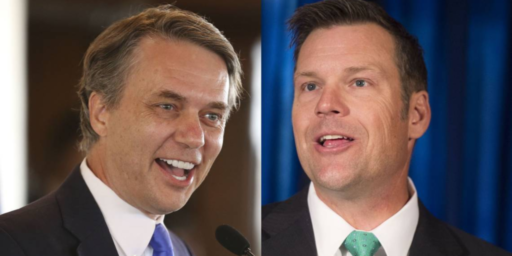
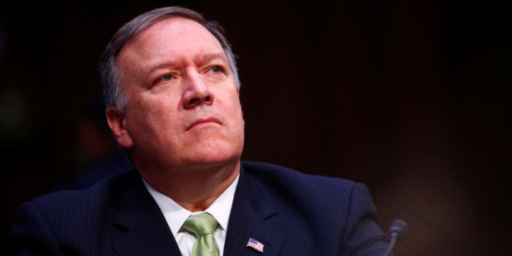
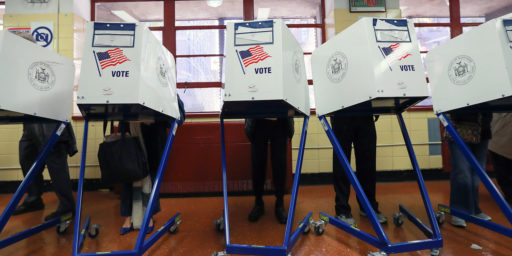
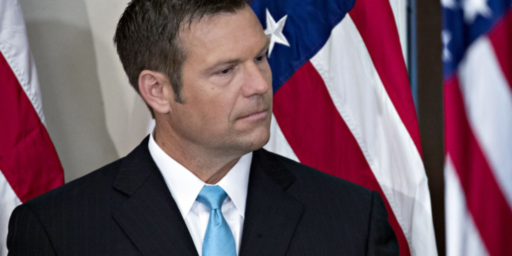
More attention should be paid to Kobach’s ties to white nationalists.
https://www.motherjones.com/politics/2018/08/does-kris-kobach-have-white-nationalists-on-his-campaign-payroll/
Kansas has a long history of voting for idiots. How they can think that following Brownback with this doofus, especially in light of his embarrassing incompetence in trying to prove voter fraud, is a good idea is beyond me.
@Kylopod:
Ditto the details of Kobach making bank by helping localities pass anti-immigrant legislation that they then pay him to defend in court (often losing). Hell of a way to make about $800,000 while sending conservative-leaning towns into debt:
https://www.propublica.org/article/kris-kobachs-lucrative-trail-of-courtroom-defeats
Mr. Kris (“There’s got to be massive voter fraud somewhere”) Kobach has said he will not recuse himself from the recount that is highly likely saying, in essence, that he doesn’t personally count the votes, county personnel do. He apparently is also cool with his office deciding on the amount of the bond that the requesting party must put up. What could possibly go wrong? I have just invested in popcorn futures.
Good grief, have the people of Kansas learned nothing since voting for Brownback? They must be masochists…
@An Interested Party: Yeah, what’s the matter with Kansas?
@mattbernius:
You say that as if it is a bad thing… You probably don’t like Sarah Palin either.
When right wing grifters grift off the right wing, it pleases me. Every dollar that they extract is a dollar that could have been used to effectively oppose things I care about.
Kobach manages to have a multiplier effect. That’s kind of awesome. I do hope we can keep him in the private sector, continuing his grift, but he’s not going to be any worse than any other Republican these days.